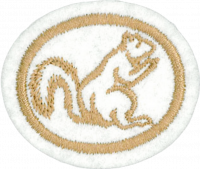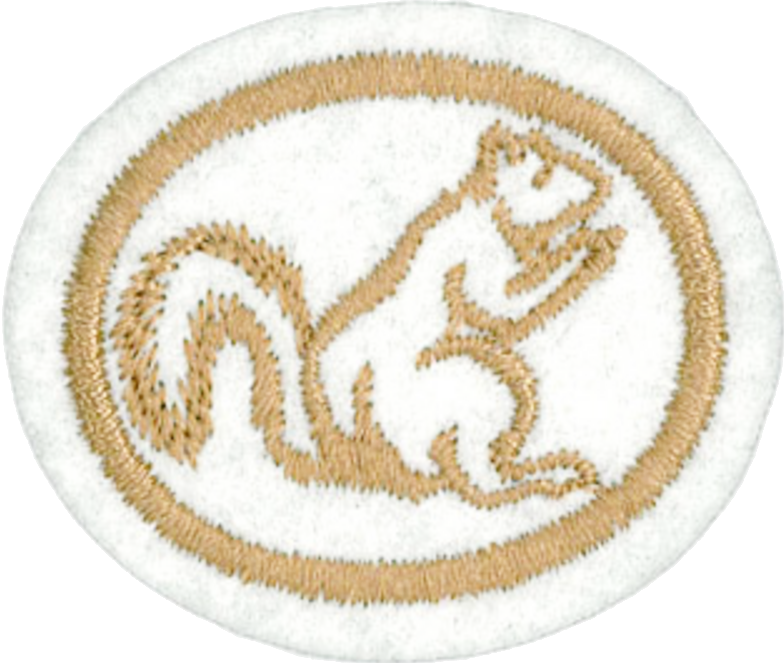Difference between revisions of "AY Honors/Mammals/Answer Key/pt-br"
From Pathfinder Wiki
(Created page with "</noinclude> ==Referências== Category:Adventist Youth Honors Answer Book/pt-br <noinclude>") |
(Created page with "</noinclude> <!-- 5. Relacione quatro coisas que os mamíferos fazem que são prejudiciais ao homem. -->") |
||
| (One intermediate revision by the same user not shown) | |||
| Line 30: | Line 30: | ||
{{CloseReq}} <!-- 1 --> | {{CloseReq}} <!-- 1 --> | ||
{{ansreq|page={{#titleparts:{{PAGENAME}}|2|1}}|num=2}} | {{ansreq|page={{#titleparts:{{PAGENAME}}|2|1}}|num=2}} | ||
| − | <noinclude> | + | <noinclude></noinclude> |
| − | </noinclude> | + | <!-- 2. Relacione 4 características de um mamífero. --> |
| − | <!-- 2. | ||
| − | |||
{{clear}} | {{clear}} | ||
| Line 48: | Line 46: | ||
{{CloseReq}} <!-- 2 --> | {{CloseReq}} <!-- 2 --> | ||
{{ansreq|page={{#titleparts:{{PAGENAME}}|2|1}}|num=3}} | {{ansreq|page={{#titleparts:{{PAGENAME}}|2|1}}|num=3}} | ||
| − | <noinclude> | + | <noinclude></noinclude> |
| − | </noinclude> | + | <!-- 3. Apresentar uma ou mais características peculiares de cada um dos seguintes grupos de mamíferos e mencionar uma ou mais espécies de mamíferos encontradas em cada ordem: --> |
| − | <!-- 3. | + | <noinclude></noinclude> |
| − | <noinclude | ||
| − | |||
{{ansreq|page={{#titleparts:{{PAGENAME}}|2|1}}|num=3a}} | {{ansreq|page={{#titleparts:{{PAGENAME}}|2|1}}|num=3a}} | ||
<noinclude></noinclude> | <noinclude></noinclude> | ||
| Line 158: | Line 154: | ||
{{CloseReq}} <!-- 3 --> | {{CloseReq}} <!-- 3 --> | ||
{{ansreq|page={{#titleparts:{{PAGENAME}}|2|1}}|num=4}} | {{ansreq|page={{#titleparts:{{PAGENAME}}|2|1}}|num=4}} | ||
| − | <noinclude> | + | <noinclude></noinclude> |
| − | </noinclude> | + | <!-- 4. Relacionar quatro mamíferos úteis e explicar a sua utilidade ao homem. --> |
| − | <!-- 4. | ||
| − | |||
| − | |||
{{clear}} | {{clear}} | ||
| Line 179: | Line 172: | ||
{{CloseReq}} <!-- 4 --> | {{CloseReq}} <!-- 4 --> | ||
{{ansreq|page={{#titleparts:{{PAGENAME}}|2|1}}|num=5}} | {{ansreq|page={{#titleparts:{{PAGENAME}}|2|1}}|num=5}} | ||
| − | <noinclude> | + | <noinclude></noinclude> |
| − | </noinclude> | + | <!-- 5. Relacione quatro coisas que os mamíferos fazem que são prejudiciais ao homem. --> |
| − | <!-- 5. | ||
| − | |||
| − | |||
| − | |||
| − | |||
| − | |||
| − | |||
| − | |||
| − | |||
| − | |||
| − | |||
| − | |||
| − | |||
| − | |||
| − | |||
<noinclude></noinclude> | <noinclude></noinclude> | ||
{{CloseReq}} <!-- 5 --> | {{CloseReq}} <!-- 5 --> | ||
{{ansreq|page={{#titleparts:{{PAGENAME}}|2|1}}|num=6}} | {{ansreq|page={{#titleparts:{{PAGENAME}}|2|1}}|num=6}} | ||
| − | <noinclude> | + | <noinclude></noinclude> |
| − | </noinclude> | + | <!-- 6. Relacionar quatro mamíferos que são completamente aquáticos e indicar sua área de distribuição. --> |
| − | <!-- 6. | ||
| − | |||
| − | |||
| − | |||
| − | |||
| − | |||
| − | |||
| − | |||
| − | |||
| − | |||
| − | |||
| − | |||
| − | |||
| − | |||
| − | |||
| − | |||
| − | |||
| − | |||
| − | |||
| − | |||
| − | |||
| − | |||
| − | |||
| − | |||
| − | |||
| − | |||
| − | |||
| − | |||
| − | |||
| − | |||
| − | |||
| − | |||
| − | |||
{{clear}} | {{clear}} | ||
| Line 241: | Line 186: | ||
{{CloseReq}} <!-- 6 --> | {{CloseReq}} <!-- 6 --> | ||
{{ansreq|page={{#titleparts:{{PAGENAME}}|2|1}}|num=7}} | {{ansreq|page={{#titleparts:{{PAGENAME}}|2|1}}|num=7}} | ||
| − | <noinclude> | + | <noinclude></noinclude> |
| − | </noinclude> | + | <!-- 7. Qual é o maior mamífero do mundo? Onde ele vive, como se alimenta e o que come? --> |
| − | <!-- 7. | ||
| − | |||
{{clear}} | {{clear}} | ||
| Line 255: | Line 198: | ||
{{CloseReq}} <!-- 7 --> | {{CloseReq}} <!-- 7 --> | ||
{{ansreq|page={{#titleparts:{{PAGENAME}}|2|1}}|num=8}} | {{ansreq|page={{#titleparts:{{PAGENAME}}|2|1}}|num=8}} | ||
| − | <noinclude> | + | <noinclude></noinclude> |
| − | </noinclude> | + | <!-- 8. Relacione oito espécies de mamíferos silvestres que você já observou e identificou pessoalmente na natureza. --> |
| − | <!-- 8. | ||
| − | |||
| − | |||
{{clear}} | {{clear}} | ||
| Line 266: | Line 206: | ||
{{CloseReq}} <!-- 8 --> | {{CloseReq}} <!-- 8 --> | ||
{{ansreq|page={{#titleparts:{{PAGENAME}}|2|1}}|num=9}} | {{ansreq|page={{#titleparts:{{PAGENAME}}|2|1}}|num=9}} | ||
| − | <noinclude> | + | <noinclude></noinclude> |
| − | </noinclude> | + | <!-- 9. Escrever ou contar uma história sobre "Mamíferos Silvestres que já observei". --> |
| − | <!-- 9. | ||
| − | |||
{{clear}} | {{clear}} | ||
Latest revision as of 21:38, 2 July 2021
1
Em que dia da criação foram criados os mamíferos?
2
Relacione 4 características de um mamífero.
3
Apresentar uma ou mais características peculiares de cada um dos seguintes grupos de mamíferos e mencionar uma ou mais espécies de mamíferos encontradas em cada ordem:
3a
Marsupialia
3b
Insectivora
3c
Chiroptera
3d
Carnivora
3e
Pinnipedia
3f
Rodentia
3g
Lagomorpha
3h
Artiodactyla
3i
Sirenia
3j
Cetacea
4
Relacionar quatro mamíferos úteis e explicar a sua utilidade ao homem.
5
Relacione quatro coisas que os mamíferos fazem que são prejudiciais ao homem.
6
Relacionar quatro mamíferos que são completamente aquáticos e indicar sua área de distribuição.
7
Qual é o maior mamífero do mundo? Onde ele vive, como se alimenta e o que come?
8
Relacione oito espécies de mamíferos silvestres que você já observou e identificou pessoalmente na natureza.
9
Escrever ou contar uma história sobre "Mamíferos Silvestres que já observei".


